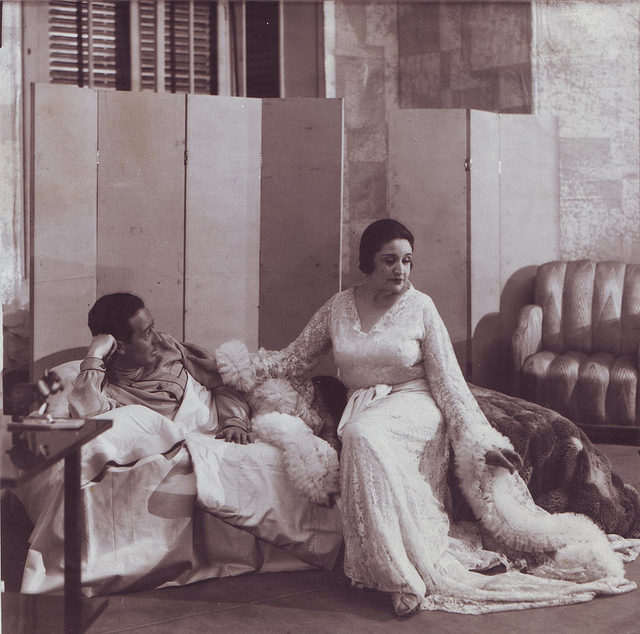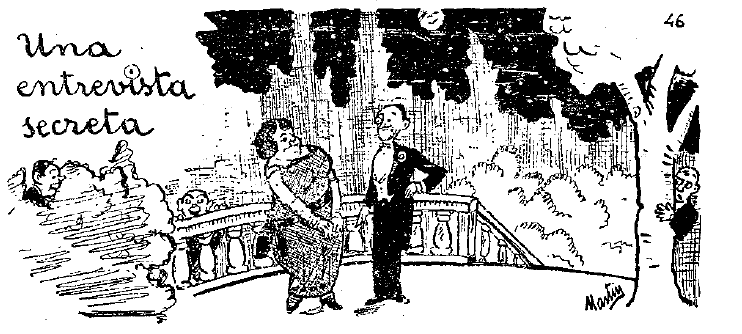
| Языки :: Испанский |
| Аудио |

 |
|
 |
|
133 |
Español |
Spanish |
|
Lección Cuarenta y seis (46) |
||
| Madre e hijo (1) |
Mother and son. |
|
| 1 |
(Después de un disgusto con su padre, Gonzalo se ha marchado para vivir independiente. |
After [of] an estrangement with his father, G. has departed to live independent(ly). |
| 2 |
En una entrevista secreta, su madre intenta hacerle regresar a casa, pero él se niega.) (2). |
In a secret interview, his mother attempts to make him comeback to (his) house, but he refuses (himself). |
| 3 |
La Madre. - ¿Y qué piensas hacer? G. - Vivir... ¿Te parece poco? M. - ¿Cómo? G. - Ya veremos. |
The mother. - And what do you intend to do? - G. : Live... (that) seems little to you? - M. - How? - G. - (We) [already] shall see. |
| 4 |
Hasta ahora no me he muerto de hambre. Esta noche he comido opíparamente... (3). |
Until now I have not died of hunger. To-night I have eaten my fill (See n..3). |
| 5 |
¿Y mañana? G. - ¿Mañana? Quién sabe? M. - Yo espero que tu orgullo no llegará a tanto que no aceptes de mí... |
M. - And to-morrow? - G. To-morrow? Who knows ? - M. - I hope that your pride will not go so far [to so much] (as) that you should not accept from me... |
| 6 |
G. - Inútil, mama. Eso seria hacer trampas al destino. |
G. - (It's) useless, mother. That would be to cheat [play snares to] with [the] fate. |
| 7 | M. - ¿ Entonces no admites ni que yo te ayude? | M. - Then you don't even [nor] admit that I help you? |
| 8 | G. - El saber que lo deseas me basta... | G. - To know [the knowing] that you desire it suffices me... |
| 9 |
M. - Gonzalo, hijo... G. - Mamá, Ya me conoces. Cuando digo que no, es que no. |
M. - Gonz. (my) son... - G. - Mother! You know me well [already]. When I say no, it is [that] no. |
| 10 |
Con lo único (4) que transigiría, si acaso... M. - ¿Con qué, hijo, con qué? |
The only thing on [with] which I should make concessions, if by chance [at case]. - M. - On what, my son, on what? |
| 11 |
G. - Si papá me da sus excusas, una vez por semana iré a casa a almorzar con vosotros, a veros, charlar... (5). (Sigue.) |
G. - If father makes [gives] me apologies, |
| EJERCICIOS | EXERCISE : | |
| 1 | Vamos a leer otra vez la lección de hoy; | We are going to read (an)other time the lesson of to-day; |
| 2 | pero vamos a suponer que madre e hijo se hablan de usted, |
but we are going to suppose that mother and son say to each other [thems. speak of] usted |
| 3 | en vez de tutearse, |
instead of saying tú |
| 4 | y vamos a hacer los cambios correspondientes, | and we are going to make the corresponding changes, |
| 5 | comprobando con lo siguiente. | verifying with the following : |
| Comprobar : to "comprove", verify, check. | ||
|
Frase 3 : ...piensa usted... le parece a usted. - 5 ...su orgullo... acepte (subjunctive, indicative : acepta). - 7 admite ... le ayude (subj.; indic. : yo ayudo). - 8 ...desea... - 9 ...conoce usted. - 11 ...con ustedes, a verles. |
| NOTES. | |
| 1 |
The theatre is excellent to learn Spanish such as it is spoken; we shall make use of it by giving you extracts of up-to-date plays, like the following, from El Balcón de la Felicidad of Honorio Maura. |
| 2 |
pero él se hiega : here the pronoun él is
necessary for the good understanding of the text. |
| 3 |
Opíparamente, synonym of
copiosamente, but more picturesque ("full to the teeth"). |
| 4 |
An adjective used as a noun, with neuter article lo. |
| 5 | Veros : see less. 49, par. 1. |
|
Destino also means post, job, particularly in civil
service. Obtuvo un destino en Gobernación : He obtained a post in the Home Office. |
